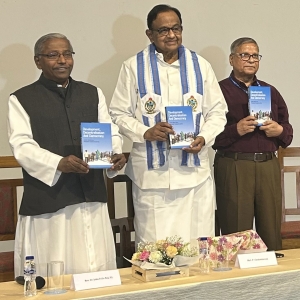
.jpg) Dr. Somak Sen
Dr. Somak Sen

Former Union Minister and currently a member of Rajya Sabha, Shri P. Chidambaram, visited St. Xavier’s University, Kolkata (SXUK) on 25 November 2023, and delivered an insightful lecture on ‘The Future of Democracy’. He also released the book, ‘Development, Decentralisation and Democracy’, authored by Father John Felix Raj S. J., the Vice-Chancellor of SXUK, and Prof. Prabhat Kr Datta, an adjunct faculty.
In his address, Shri Chidambaram, lamenting on the state of governance in the country, said, “The fundamental message that I wish to convey is that democracy has been, over the years, hollowed out in this country.”
The book, published by Heritage Publishing House, Kolkata, is a tribute to the legacy of the esteemed Jesuit, Father Albert Huart. Father Huart dedicated his entire life to champion the cause of value-based education in Bengal and across India. The book was aptly released in the hall named after him. The authors paid their deepest respect to Fr. Huart.
In three sections spanning over 330 pages, the book captures how the three dominant paradigms of social sciences, namely, development, decentralization and democracy, are intertwined and bound together. While the first one refers to the goal, the other two are regarded as instruments for achieving it – development of the people through their active participation.
The book seeks to capture the changing nature and context and emerging conceptual dimensions and to examine and re-examine their validity in the light of realities in our country.
The first section, comprising of 4 chapters, begins by redefining development in the historical context, and analyses the core and underpinnings of the concept of development, to present before the readers a comprehensive and contemporary perspective. The authors focus on the social values of development before attempting a critical appraisal of the economic reforms in India in which disinvestment figures prominently. The section ends with ethical governance for combating corruption.
Five chapters make up the second section, which seeks to describe and evaluate the experiences of the different models of decentralized governance in rural, urban and hilly regions. An analysis of the role of civil society in the neo-liberal context of governance in India provides the foil to the discussion on decentralization. Analyses of two instances are laid out as examples for consideration. How the state of Kerala could deal with the first phase of COVID-19 pandemic more successfully than other states with the help of the vibrant decentralised democratic structures at the grassroots and effective state-society relationship. A critical review is presented of another innovative experiment of decentralised governance in one of the hill districts in India, Darjeeling, in pursuance of the Fifth Schedule of the Constitution.
The third section of the book seeks to explore the dynamics of deliberative democracy in rural and urban India in the light of available empirical studies and highlights the bottlenecks and action plan to make deliberative democracy a more meaningful proposition in our country.
(Dr. Somak Sen, Asst. Professor, Dept. of Mass Communication, Email: somak.sen@sxuk.edu.in)